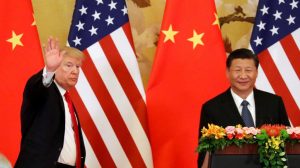Grievance economics versus globalisation

US president Donald Trump and China’s president Xi Jinping are poles apart when it comes to globalisation/ Reuters
Back in the 10th century, the Baghdad-born traveller Al Masudi wrote about China, its rule of law and careful attempts to ensure justice to its citizens and to foreign visitors. He provided anecdotal evidence of the just treatment meted out to Arab traders.
The account by Al Masudi, sometimes described as the Arab Herodotus, is significant in the context of last week’s events in Danang, Vietnam. It showed a China that led because it was exemplary. At the Asia-Pacific Economic Summit in Danang, Chinese president Xi Jingping defended globalisation as an “irreversible historical trend”. He spoke about the digital economy, quantum science and artificial intelligence, thereby joining the present to the future in one aspirational arc. In contrast, US president Donald Trump warned against attempts to mistreat his country and take economic advantage of it.
Did the back-to-back speeches mark the formal start of rival campaigns to shape the world order on the part of the Group of Two (G2), the two largest economies on the planet? If so, they might be said to herald a different G2 as well — grievance economics versus globalisation.
Mr Trump, after all, railed against multilateral approaches to trade, berated the decades-old US policy of lowering barriers and accused the World Trade Organisation of treating the United States unfairly. He told leaders of the Asia-Pacific Economic Cooperation he would no longer allow predatory economic policies that “stripped” jobs, factories and industries out of the US. “These chronic trade abuses” belonged in the past, he said, because the US would no longer “enter into large agreements that tie our hands”. That might justifiably be called grievance-enomics. US policy is to be based on a sense of injustice centred on multilateral accords, although the US has often run trade deficits even with low-trade barrier countries such as Mexico and Canada.
Then there is globalisation as championed by Mr Xi. The concept benefits China, for now. It is not altruism by any means. China is keen on self-interested guarantees for free trade. There is much to criticise about its cherry-picking of aspects of the “international order”, as Chinese officials prefer to call it. And China needs to reform state-owned enterprises, rather than allow super-sized firms to distort global markets, notably in steel and construction.
So just how safe would the global trading system be in Chinese hands? After all, Beijing promises free trade without a belief system premised on parallel political and social freedoms. It is not a truly free economy, even though it has made demonstrable progress since joining the WTO in 2001. Can globalisation simply be transferred hand-to-hand from the Americans to the Chinese like a product that has — and needs — no inherent values to make its reality meaningful?
Any answer must look at the present as it shades into the future. Mr Xi’s Apec speech offered a technology-enabled vision of tomorrow, something that China is increasingly qualified to push. At least two dozen police departments in the country claim to put advanced facial recognition technology to good use. In a Beijing park, for instance, the authorities have employed a high-tech solution to the problem of misuse and waste of toilet paper. Visitors to the toilets must subject to face scans, upon which a two foot-long piece becomes available. The user must wait nine minutes and undergo another face scan if he or she is to access more toilet paper. Extreme though it may sound, it is effective.
In tomorrow’s world, technology’s role in moulding social behaviour will be just as important as in dreaming up new solutions for economic empowerment and smart infrastructural projects in developing countries. As Abdullah Al Dardari, a World Bank advisor on Middle East and North Africa reconstruction recently pointed out, old-style bricks and mortar cannot meet the massive challenges posed, say, by the destruction of Syrian schools. “Rebuilding physical assets will not work,” he said, “we’re talking about heterodox economics”.
That said, grand speeches by Mr Xi cannot wish away the uncomfortable reality faced by China’s single biggest branded initiative to broaden the world economy. One Belt One Road is meant to link China with Africa, Asia and Europe through a network of ports, railways and roads, cutting transportation costs and providing more connectedness.
But some of the projects, such as a high-speed rail link in Indonesia, have stalled, others have run into local opposition and a few are beset by security concerns. In the economic corridor running through unquiet parts of Pakistan, Chinese nationals have been killed or kidnapped. China’s new visibility and manifest power bring with them risks as well as responsibilities.
None of this means China can’t manage globalisation. Just think back to Al Masudi’s book, The Meadows of Gold and Mines of Precious Gems. Is it so outrageous that China could return to playing a key role in a globalising world? It did it before, more than 1,000 years ago.
Originally published at www.thenational.ae

